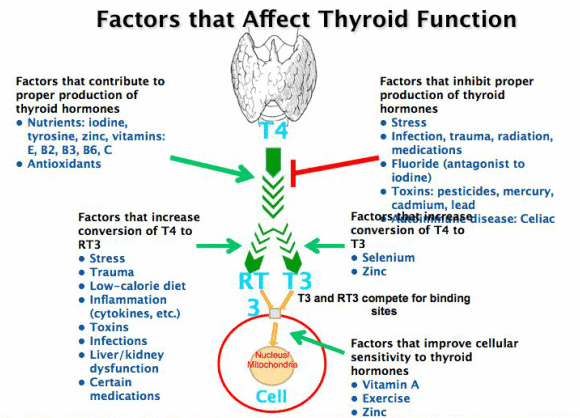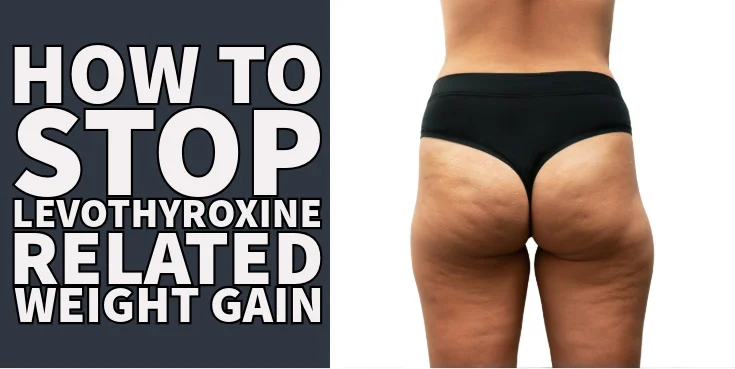Are you on levothyroxine but still gaining weight?
Believe it or not, this is a big problem for a lot of people.
But how can you be gaining weight on a medication that is supposed to increase your metabolism? Is this even possible?
Absolutely.
The truth is that levothyroxine doesn’t necessarily increase your metabolism and studies show that most people who start it typically don’t lose any weight at all.
Worse than this, some people gain weight when they take it.
Today I’m going to explain why this phenomenon happens and what you can do about it if it has already happened to you.
DOWNLOAD FREE RESOURCES
Foods to Avoid if you Have Thyroid Problems:
I’ve found that these 10 foods cause the most problems for thyroid patients. Learn which foods you should avoid if you have thyroid disease of any type.
The Complete List of Thyroid Lab tests:
The list includes optimal ranges, normal ranges, and the complete list of tests you need to diagnose and manage thyroid disease correctly!
You Can Take Levothyroxine & Still Not Have Enough T3
The first thing you need to understand about levothyroxine is that it contains a thyroid hormone that is considered inactive.
By itself, it doesn’t do anything except act as a reservoir for T3 and T3 is the most active thyroid hormone in your body.
When doctors prescribe levothyroxine, they are doing so with the intent that your body will be able to activate it so it can be used.
But that doesn’t always happen.

In fact, many thyroid patients are unable to activate T4 into T3 and have what we refer to as a thyroid conversion problem.
And to make matters worse, some people create the anti-thyroid metabolite reverse T3, instead.
Reverse T3 acts to block the binding of T3 at the cellular level.
The more reverse T3 you have, the less functional your thyroid is.
How Levothyroxine Causes weight gain
So how does this all relate to levothyroxine and weight gain?
We can look at some studies to help us understand:
Take for instance this study.
In it, patients were given T4-only medications and treated based on their TSH, very similar to pretty much everyone reading this right now.
The researchers then tested their resting energy expenditure (in other words, their metabolism) both before they added the thyroid hormone and after they suppressed the TSH.
And do you know what they found?
They found that thyroid patients taking thyroid hormone, even with a suppressed TSH, did not see an increase in their metabolism or their body weight.

This would run counter to what you would expect, especially given that thyroid hormone is the major regulator of metabolism in the body.
Either physiologists have been wrong about thyroid hormone for centuries, or, it may have something to do with the type of medication that these patients were given.
In other words, would they have lost weight if they used a thyroid medication that contained T3 instead of T4?
That’s a more interesting question that was answered in this study:

In this study, patients were given either a T4-only medication (like levothyroxine) or a Desiccated Thyroid Extract (like Armour Thyroid) and evaluated over a period of time.
They found that those patients who were taking the desiccated thyroid extract experienced “modest” weight loss to the tune of about 3 pounds compared to the T4-only group.
This may not sound like a lot of weight loss but remember, it happened without any other intervention.

These results support the idea that thyroid hormone regulates metabolism, but that T3 does a much better job than levothyroxine.
But we don’t have to stop here, there’s one more study worth mentioning:
This one compared equivalent doses of both T4 and T3 thyroid medication, based on the TSH, and then evaluated for body weight and cholesterol.

This study showed that patients who were taking T3-only medication had more weight loss and better cholesterol than patients who were taking T4-only medication.
In other words, pound-for-pound, T3 thyroid hormone is far more effective than T4 thyroid medication at managing thyroid function.
And practically speaking, this means that levothyroxine will not have any impact on weight for most people who take it.
This may be news to you, but it isn’t to most doctors. They are just afraid to prescribe T3.
Which is why it’s important to note here that the patients in this study who took T3 did not have any change in their blood pressure, heart rate, or insulin sensitivity which are the common reasons doctors give for not prescribing T3.
These three studies do not prove that levothyroxine will necessarily or automatically cause you to gain weight, but they do shed light on how it’s unlikely to help you lose weight.
When you combine this fact with the real scenario that many thyroid patients are being under-treated and not taking full advantage of lifestyle changes like diet and exercise, it’s easy to see why so many people report weight gain when taking it.
The good news is that you do not have to accept this weight gain because there are things that you can do about it:

Step #1: Check your free T3 and Total T3
The absolute best way to know if levothyroxine is working for you is by evaluating these two lab tests.
The reason it works is simple:
Remember, levothyroxine only contains T4 thyroid hormone, but in order to be used by the body, it must be turned into T3.
So if you are taking levothyroxine and you are not seeing an increase in your free T3 or total T3 afterward, then it is very likely that your body is not activating it.
And we know from the studies that I mentioned before if you are not activating it then it will not have the positive impact that you are looking for on your metabolism.
Unfortunately, many doctors are often unwilling to order these tests, usually because they don’t know how to interpret them, which is where step #2 comes into play:
Step #2: Check your basal body temperature and resting heart rate
You don’t have to do this step if you can get your free T3 and total T3 labs checked, but if you can’t, for whatever reason, or if you just want to get started right away, you can look at these two metrics.
Both your heart rate and body temperature can be used as proxy measurements of global thyroid function.
They aren’t perfect, but they are a down-and-dirty method that can give you an idea as to whether or not your body is activating your levothyroxine.
They work because as T3 increases, so too will your resting heart rate and basal body temperature as these are both correlated with basal metabolic rate.
You will know pretty quickly if levothyroxine is not doing its job because your body temperature will be less than 98.6 degrees and your resetting heart rate will be in the 50s.
Someone who has normal thyroid function and normal T3 levels should see a normal body temperature and a resting heart rate somewhere in the 70s.
Step #3: Create a more comprehensive thyroid hormone routine
As I alluded to previously, it’s actually really to solve this problem and help your levothyroxine do its job.
All you need to do is mimic the thyroid hormone production of the healthy thyroid gland.
This makes a lot of intuitive sense, but, for whatever reason, very few doctors and patients actually do it.
The healthy thyroid gland produces a combination of T4, T3, and T2 thyroid hormones.
But when you take levothyroxine, you are only giving your body one of those three important hormones.
The reality is that you can take all three and doing so helps many thyroid patients get back to feeling 100%.
For most people, it looks like this:
- 80% of your total thyroid dose should be T4 as levothyroxine or some equivalent – Practically speaking, this is usually around 80 to 100 mcg.
- 20 % of your total thyroid hormone dose should be T3 as liothyronine or some equivalent – Practically speaking, this is usually between 5-20 mcg.
- 100 to 200 mcg of T2 thyroid hormone as 3,5 diiodo-l-thyronine – T2 is the only thyroid hormone available over the counter and can be purchased in supplement form.
I’ve already done the research to come up with these ratios and doses and they are based on what the healthy thyroid gland produces and what most thyroid patients feel better on.
Some deviation may be needed, of course, but I would recommend starting here.
Does this mean that levothyroxine never works?
Does Levothyroxine Ever Cause Weight Loss?
Does this mean that levothyroxine never works?
Not at all.
There are definitely some people who get by just fine using only levothyroxine without any other thyroid hormones.
You really won’t find those people around here, though, because as a percentage of the whole, they are relatively small at around 20%.
And they don’t go around looking for advice on how to lose weight on levothyroxine because they don’t have that problem.
But the truth is that levothyroxine is fine for a small minority of people as long as they are able to activate it.
What’s key here is understanding that just because levothyroxine by itself doesn’t work for many thyroid patients, doesn’t mean that it is a bad medication.
Unfortunately, this is the conclusion that many thyroid patients jump to.
It’s not that levothyroxine is bad, it’s that your body is unable to use it.
But this problem can be solved with the addition of other thyroid hormones.
So don’t make the mistake of thinking that you must use a certain type of thyroid medication to feel better.
After all, levothyroxine is incredibly easy to get and incredibly cheap.
In a perfect world, all thyroid patients would be taking thyroid hormone cream that includes T4, T3, and T2 or Tirosint-Sol with liothyronine and T2, but we don’t live in that world and not everyone has access to these medications.
So in the meantime, don’t be afraid to play around with levothyroxine if that’s what’s available to you.
I have seen many thyroid patients get back to feeling 100% when using it in conjunction with T3 and T2.
By the way, many thyroid patients have never heard about T2.
If that’s you, then I would recommend reading this article next.
It discusses the amazing benefits of this thyroid hormone and how it helps with weight loss.
Scientific References
#1. http://linkis.com/www.ncbi.nlm.nih.gov/0wh6l
#2. http://www.ncbi.nlm.nih.gov/pubmed/23539727
#3. https://www.ncbi.nlm.nih.gov/pmc/articles/PMC3205882/
#4. https://www.ncbi.nlm.nih.gov/pubmed/8903695
#5. http://www.ncbi.nlm.nih.gov/pmc/articles/PMC2292454/
#6. http://www.ncbi.nlm.nih.gov/pubmedhealth/PMH0072785/
#7. https://www.ncbi.nlm.nih.gov/pmc/articles/PMC3219766/
#8. https://www.ncbi.nlm.nih.gov/pmc/articles/PMC4737508/
#9. https://www.ncbi.nlm.nih.gov/pubmed/8834378
#10. https://www.ncbi.nlm.nih.gov/pmc/articles/PMC2277319/
#11. https://www.ncbi.nlm.nih.gov/pubmed/20883174
#12. https://www.ncbi.nlm.nih.gov/pubmed/20823774
#13. https://www.ncbi.nlm.nih.gov/pubmed/3630857
#14. https://www.ncbi.nlm.nih.gov/pmc/articles/PMC3520819/
#15. http://www.ncbi.nlm.nih.gov/pmc/articles/PMC3978663/
#16. https://www.ncbi.nlm.nih.gov/pmc/articles/PMC4056127/
#17. http://www.ncbi.nlm.nih.gov/pubmed/21077724
#18. http://www.ncbi.nlm.nih.gov/pubmed/25555216
#19. http://www.ncbi.nlm.nih.gov/pubmed/19190113










